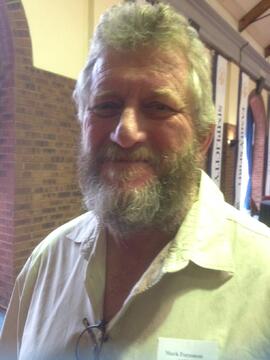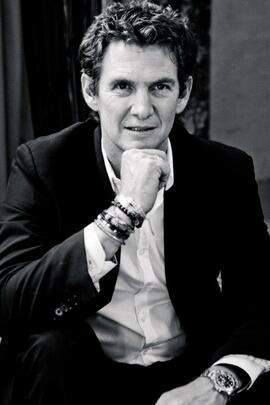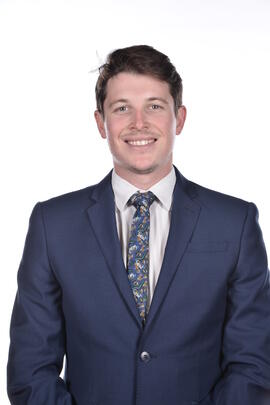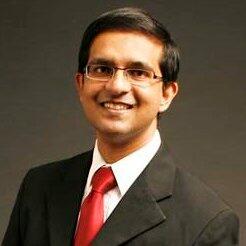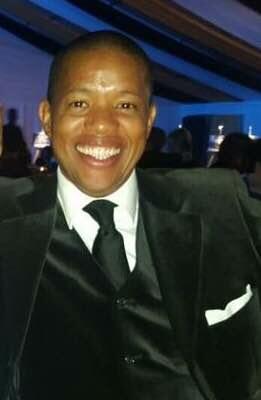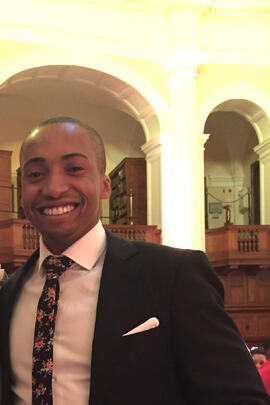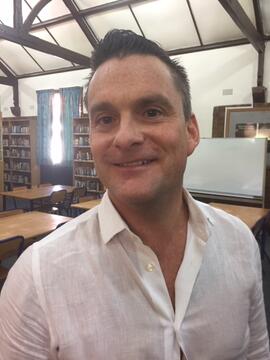Interview with Mike von Guilleaume 1995
- ZA ZAR STDS 202000858
- Stuk
- 2012
Interview with Mike von Guilleaume – 1995
Mike followed in his father’s footsteps beginning his career at St David’s in grade 0 and his
brother Terence was also a pupil finishing in 1990. Mike’s father matriculated in 1954. Mike’s
father’s parents moved to South Africa from Germany and his father matriculated in 1954. As
his mother was a staunch catholic Mike was enrolled as a pupil at St David’s, however when he
reached high school his father took him to Hilton as he wanted to anglicise him. On the second
day he ran away spending two nights in the forest and eventually phoned his parents and
refused to divulge his whereabouts until they promised him he could go back to St David’s.
Mike’s mother was in charge of the catering at the school until 2001. Mike’s father was heavily
involved with MOBS which meant that Mike spent a great deal of time at St David’s socialising
with Marist boys such as Doug Wickins, Alec Quail, Darko Vidas and Vito Rugani.
Mike first teacher was Mrs Kerstofen and his class is where the after care is now. Mike recalls
that the soccer clinics in the primary school were legendary with Willy Castle in charge showing
an 8mm movie at the end of the festivals. Mike remembered playing soccer in Germiston, where
the boys lost badly as they were all too busy watching the planes flying overhead. Willy
organised a soccer tour for the standard 5’s travelling to Belgium and Mike’s brother was lucky
enough to be part of the team.
George the tractor driver used to give the boys lifts and Mr Freilich gave them super C’s when
they went to his office. The boys all watched Mrs Carlisle, their grade 1 teacher on TV when she
crossed the finishing line completing the Comrades marathon. In grade 2 Mrs Schaafsma had
a punishment mat and administered hidings with her wooden ruler. Mike also remembered
teachers such as Glenda Anderson; Debby Hurley; Mrs Orford who gave recorder lessons, Bev
Geldenhuys and Mrs Morkel, standard 5.
Mike’s first holy communion was held in the old hall followed by a meal. He remembers going to
the Bunny Park, to the Good Shepherd camp at Hartbeespoort. There were Malawian twins who
attended the school Lester and Bester, sadly their mother died after stepping on a garden rake
and the wound became septic.
In standard 7 Mike together with Michael Ward and Richard Pin went on a cricket tour to
Zimbabwe organised by Father Brewer and Cedric Finlayson. They played against Plumtree,
Falcon House, and CBC Bulawayo drawing 4 of the matches which were played against teams
consisting of some members of the Zimbabwe rugby team. The boys took cricket gear with them
for the boys there and some of the boys suffered from food poisoning after eating the dormitory
food.
In high school, one of the boys, David Salmon put his scissors in a plug socket in the science
lab and caused a mighty bang but fortunately didn’t kill himself.
At the beginning of standard 9, in abstentia, Mike was voted in as chairman of the MDC - matric
dance committee. Mike played in various age group teams and was at one time captain of the
rugby and cricket teams.
Mike was involved in a number of high school pranks and from standard 8, whilst his mother ran
the tuck shop, Mike managed to sell beers from her catering stock. Mike participated in the
rugby tour to Australia in 1995 and as head boy was part of the disciplinary committee together
with the tour captain and staff. Mike and the tour captain were caught breaking curfew and were
hauled in front of the disciplinary committee and then told to design their own punishment. They
decided not to have any more social rights for the remainder of the tour and offered to sign in
the other boys relieving Graeme McMillan, Greg Lambe and Andrew Brownlee the coaching
staff. Their proposal was accepted and Father Brewer checked up on them for the first two
nights but over the remaining 14 nights they went out after curfew without getting caught. He
remembers how naive they were walking into gay bars and strip clubs. The black guys got most
of the attention from the girls being so rare. One of the boys, Merryman was particularly naughty
and nearly missed the flight back home.
Matric was challenging as Mike was in a position of authority but he was fortunate in having
Paul Edey as headmaster, He was a great leader, not at all autocratic and worked together with
the boys. There were 44 boys in the matric class that year. The school had a strong rugby team
losing one game out of 26 so it was easy to generate a good spirit amongst the boys and it
wasn’t difficult to get the school to get things done. Mike had a good relationship with the
teachers, helping with sports practices thereby taking some pressure off the teaching staff.
The staff Mike remembers are Richard Girdwood who taught matric English but never once
spoke about the set work as the boys were very adept at encouraging him to stray off the
subject. He taught them about life and used a sawn off hockey stick “Jemma” to discipline them.
Gary Norton used to make the boys do push ups. Cedric Finlayson was the sports coach with a
temper. There were the ground staffs at the time Julius, Enoch and Victor. Mike Midgley swotted
him with a cricket bat for being cheeky.
Mike enjoyed school, had fun and got involved with school plays doing the sets. He and Jeremy
Wickens had been together since grade 1 and he remembered that Jeremy was awarded a
Marist provincial blazer. Anthony Bayne came to St David’s from Jan Cilliers and found it to be
quite a culture shock. It must also have been quite an adjustment for Sidney Ngwenya who was
the Lubner’s maid’s son. Together with the co-workers Mike went on a trip to Slough and was
also involve with the SMILE programme.
Mike achieved a very average matric as his focus was on getting the most out of life but he
enjoyed History with Simon Fry. After leaving St David’s, Mike went to Pamona College in
Claremont, California. Pamona was a liberal arts college built on the Oxford/Cambridge model,
it was small and very academic. He studied PPE - politics, philosophy and economics majoring
in economics and lived in the States for 4 years. He then worked in management consulting and
is now in the media industry working for Random House/Struik.
Mike joined MOBS in 2004 and is always grateful that he received an old boy’s bursary in 1978.
Mike is still in touch with many of his class mates even though many of them no longer live in
South Africa.
Warren Mandy – warren.mandey@bytes.co.uk
Anthony Bayne – Anthony_bayne@ml.com
John Tilley – jonjontilley@yahoo.com
Korabo Denalane – 084 777 5122
Brad Latilla Campbell is Mike’s nephew, his sister Celeste’s son. Callum Latilla-Campbell is now
at St Albans. Jack Latilla-Campbell, is in Gr 0
Warren Yoko is also a nephew
Greg Lambe taught at St David’s
Antoinette Lambe, Mike’s sister also taught at St David’s and sons Tristan is in Gr 00 and
Keegan now in Gr 3
Mike’s brother Terence is living in the States with 2 sons and also has another sister living there
with 2 daughters and 1 son.
JLE May 2012
Egenrieder, Julie

